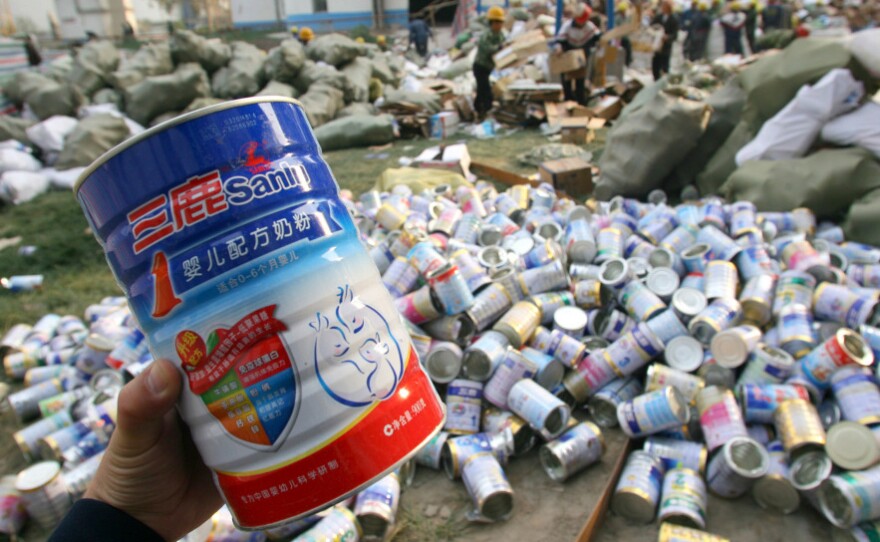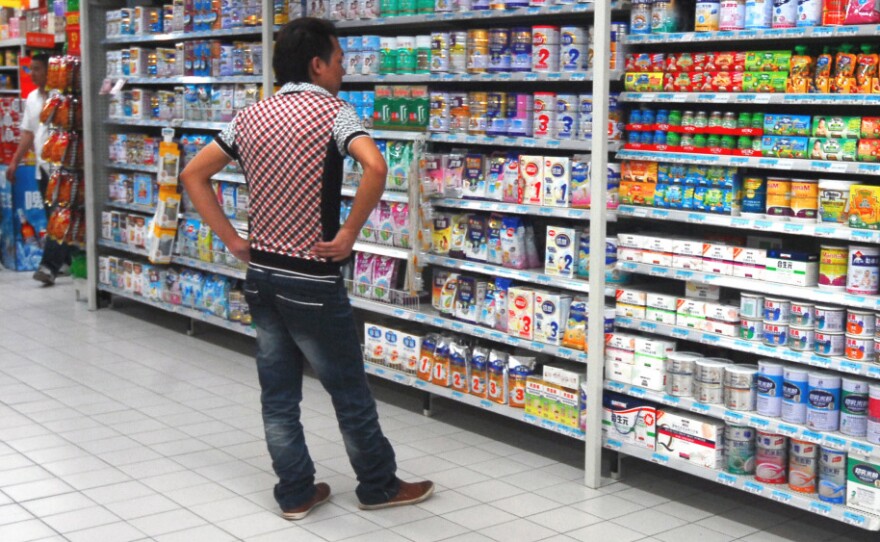Two years ago, China was rocked by food safety concerns when the milk powder parents were feeding their infants was found to be laced with melamine, an industrial chemical. Scores of babies were sickened, and six died. Now, as worries about the food industry persist, many Chinese are more careful about the foods they're buying.
In Shanghai, the health scares surrounding the milk powder from the Sanlu company so worried Wang Xueni that she gave her daughter, now 2 years old, only foreign milk powder that her husband brought back from business trips.
"I am very worried about the food safety now. To be honest, I don't trust the quality of the food at all -- vegetables, fruit, meat or eggs," Wang says while shopping in a supermarket near the investment company where she works.

When she heard that an organic farm called Kaixin was starting up on the outskirts of the city, she says, she immediately went to check it out.
"I always buy organic food now anyway. Kaixin farm delivers to my home, and I know I can trust them because of the way they grow their vegetables," she says.
Kaixin's owner, Yuan Ning, spent years in banking but grew tired of the rat race. He saw in running an organic farm a business opportunity that coincided with his own desire to live a simpler, healthier life.
"After the Sanlu milk scandal, we realized we were not eating safely. We had sacrificed our happiness and our health," he says. "In chasing money, we had forgotten the basic essence of life."
A few years ago, Yuan says, there was almost no organic farming in China. Now it's becoming an industry, he says, as people become more and more concerned, especially for the health of their children.
Another Case Of Tainting?
Some parents say their children are still suffering horrendous effects from tainted milk.
In a rundown two-room apartment beside a huge power station in the northern city of Changchun, Gao Feng sits with his daughter, Gao Zihan. She's 9 months old but looks about twice that age.
Gao says his daughter was a healthy baby, with a very healthy appetite for powdered milk. The family used the Chinese brand Shengyuan, and everything went well until she was about 6 months old, when she started bleeding.
"We went to many hospitals, but no one could tell us why she was bleeding from inside. It lasted just five to six days each time, just like a grown woman's menstrual period," he says. "In the end, the doctors concluded that it was my daughter's menstrual cycle starting. She's 9 months old, but the doctors say her ovaries and her breasts are developing, too."
Gao says he suspects the cause was milk powder infected with some kind of hormone. As soon as they switched to another brand, he says, the bleeding decreased. The company, Shengyuan, in Beijing has vigorously denied any connection. The company did not return repeated requests from NPR for a statement.
Gao has gathered medical records and even shocking photographs to back up his case.
"The Chinese media can't report this anymore. We've called the company many times, but they stand by a government report that was issued saying there is no link," he says.
Other parents also contacted by NPR say their daughters have similar symptoms.
'Nothing Has Changed'
But it's not just Chinese parents who say food safety in China seems unaffected by the Sanlu scandal of two years ago.
A Canadian who has been in Shanghai for 15 years, Richard Gelber says regulations are simply not enforced in China's food industry, and he has a wealth of horror stories about bleached mushrooms and dyed raspberries and hormone-injected milk.
"You're asking me what has changed since Sanlu. Nothing has changed. Nothing," says Gerber, a father who now runs the hotel service company Gusto.
Gerber says the problems go right down the food chain, including the so-called organic goods that the new middle class are buying.
"Why should I trust anything that I am being told in this country?" he says. "There is a lot to love about China, and there's great business opportunities, but this is not Kansas here. And anything is possible. If you want to be here, you have to accept the good with the bad, and if you cannot accept it, well, then you need to leave."
And many foreigners, horrified by the food safety situation, do exactly that. But for ordinary Chinese people, that, of course, is not an option.
Copyright 2022 NPR. To see more, visit https://www.npr.org. 9(MDAzMjM2NDYzMDEyMzc1Njk5NjAxNzY3OQ001))







